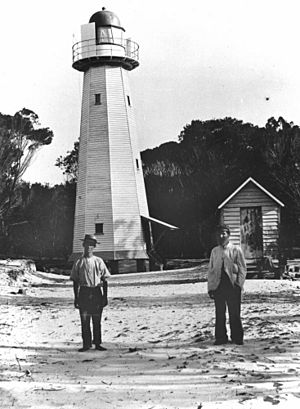Comboyuro Point Light facts for kids
 |
|
| Comboyuro Point Light in 1906 | |
|
Lua error in Module:Location_map at line 420: attempt to index field 'wikibase' (a nil value). |
|
| Location | Moreton Island Queensland Australia |
|---|---|
| Year first constructed | 1874 |
| Automated | 1954 |
| Deactivated | 1960 |
| Construction | wooden tower |
| Tower shape | octagonal tower with balcony and lantern |
| Markings / pattern | white tower |
| Range | 9 nautical miles (17 km; 10 mi) |
| ARLHS number | AUS-294 |
The Comboyuro Point Light, also known as Comboyuro Light, was a lighthouse located at the northwestern tip of Moreton Island. This island is in Queensland, Australia. It was one of the important Moreton Island lighthouses, helping ships find their way safely.
Contents
History of the Comboyuro Point Light
Early Days of the Light
The very first help for ships at Comboyuro Point was a small room built in 1863. It had special kerosene lamps to shine a light. In 1867, this lightroom was replaced with a wooden tower.
A taller wooden tower was built in 1874. This new tower had a special "condensing apparatus" to make the light brighter. The older wooden tower was moved to Burnett Heads. It is now known as the Old Burnett Heads Light.
In 1909, records show the Comboyuro Point tower was still made of wood. It used a "fixed fourth order dioptric apparatus." This was a type of lens system that made the light strong and steady. The light showed both red and white sections. Ships could see it from about 9 nautical miles away.
Moving the Lighthouse
Lighthouses usually stay in one place, but the Comboyuro Point Light had to move! This was because of coastal erosion. The land around the lighthouse was slowly being washed away by the sea.
The tower was moved inland twice to keep it safe. In 1890, it was moved about 200 feet (61 meters). Then, in 1905, it had to be moved another 366 feet (111.6 meters).
The lighthouse keeper's cottage also had to be moved. This was a four-bedroom house with a metal roof. It was moved in 1906 to protect it from the eroding coastline.
The Final Years
In 1954, the lighthouse was updated. It was changed to use acetylene gas for its light. This meant the light could work automatically. Because it was automated, a lighthouse keeper was no longer needed to live there.
Sadly, the erosion continued. In October 1960, the lighthouse was officially stopped from working. Later that same year, the wooden tower finally collapsed into the sea. The keeper's cottage was also taken down in the 1960s. Today, there is no longer a lighthouse at Comboyuro Point.
 | Percy Lavon Julian |
 | Katherine Johnson |
 | George Washington Carver |
 | Annie Easley |

